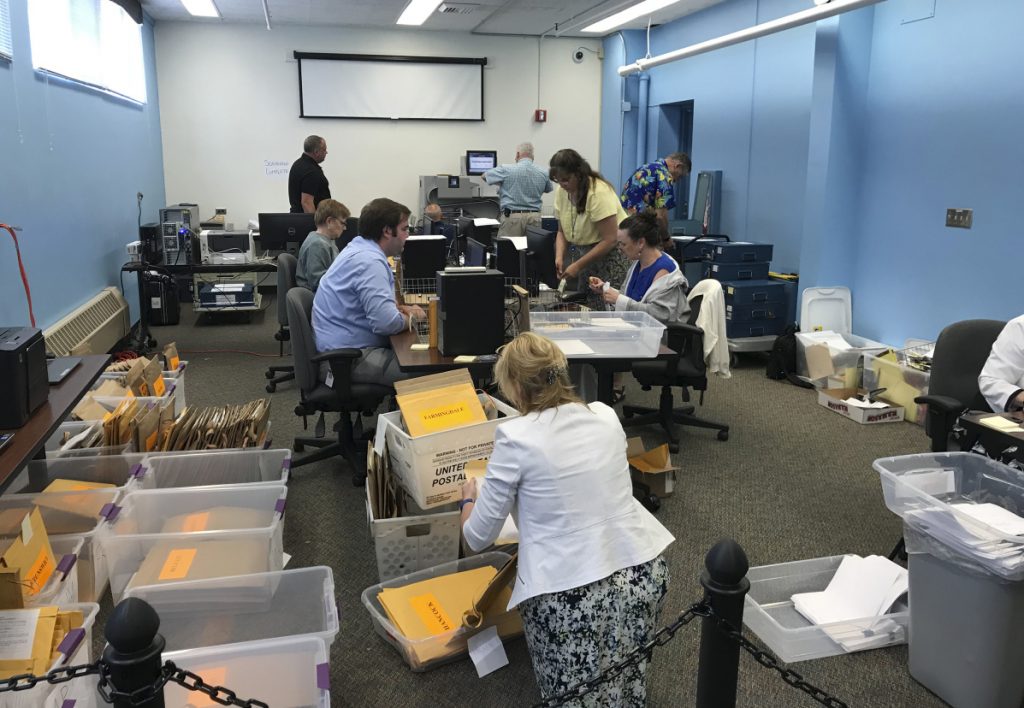
AUGUSTA — Maine may finally learn Tuesday which Democrat will represent the party in this fall’s race for governor.
Election officials continued processing voting results from across Maine on Monday and, by 5 p.m., had scanned or downloaded ballots from all but 30 or so of the 500 towns, cities and districts where ranked-choice voting took place June 12. Once those final ballots have been processed, the secretary of state will officially tally the votes before announcing which races will be decided through a ranked-choice tabulation.
“Expecting to be ready to tabulate results sometime tomorrow,” the Secretary of State’s Office said on Twitter Monday evening. “Will announce two hours prior.”
The seven-person race for the Democratic gubernatorial nomination is all but guaranteed to require a ranked-choice tabulation, which takes into account voters’ second-, third- or lower preferences in order to determine a winner. The Democratic primary for Maine’s 2nd Congressional District also appeared headed to the ranked-choice process.
In the Democratic race for governor, Attorney General Janet Mills of Farmington was leading attorney and veteran Adam Cote of Sanford by roughly 5,500 votes in the unofficial results compiled by the Portland Press Herald and The Associated Press. Betsy Sweet of Hallowell and Mark Eves of North Berwick were trailing far enough behind that, absent a major upset, the votes from their supporters are likely to tip either Mills or Cote over the 50 percent threshold needed to claim the Democratic nomination.
The winner will face off against businessman Shawn Moody of Gorham, who won the Republican nomination outright last week, and at least two independents in November.
In the three-person Democratic primary for Maine’s 2nd Congressional District, Jared Golden’s 49 percent was just shy of the 50 percent needed to avoid a ranked-choice tabulation. Lucas St. Clair of Hampden had received 41 percent of the vote and Craig Olson of Isleboro received 10 percent, according to the unofficial results.

“We are making history,” said Kyle Bailey with the Committee for Ranked Choice Voting, which led the two referendum campaigns to implement the process in Maine. “We’re the first in the nation to use ranked-choice for a statewide primary.”
Tuesday’s results are likely to draw national attention after a weeklong, unprecedented process.
Under the ranked-choice system, voters select candidates in order of preference. If no candidate receives more than 50 percent of the vote in the first count, the candidate with the fewest first-choice votes is eliminated. Voters who preferred the eliminated candidate would then have their ballots added to the totals of their second-ranked candidates, and the ballots would be retabulated. The process continues until one candidate has a majority and is declared the winner.
Mills currently has 33 percent of the vote, followed by Cote at 28 percent of the vote, Sweet at 16 percent and Eves at 14 percent. The remaining three candidates – Mark Dion of Portland, Diane Russell of Portland and Donna Dion of Biddeford – all received less than 5 percent of the vote.
The ranked-choice process has taken nearly a week to complete because of Maine law and the simple logistics of collecting paper ballots or electronic records – optical scans of ballots loaded onto memory sticks – from 500 locations around the state. Maine law gives municipalities three days to send their results to Augusta, but the Secretary of State’s Office hired a private courier to collect the ballots.
The final delivery came just before 5 p.m. on Monday from Cary Plantation, a municipality of roughly 200 residents along the Maine-Canada border in Aroostook County.
The paper ballots from more than 200 municipalities had to be scanned into the computer system in Augusta using a high-speed optical scanner. Meanwhile, enormous image files of ballots from the remaining municipalities had to be downloaded from memory devices sent by towns.
Elections staff will also have to hand-enter votes from towns that ran out of paper ballots on June 12 and resorted to photocopies of the ballots. Because those photocopies are on paper with a different thickness and quality than the official state ballot, they cannot be scanned accurately by the optical scanner, Secretary of State Matt Dunlap said Monday morning. Cape Elizabeth alone had more than 300 votes that will have to be entered separately.
But Dunlap was pleased with the process so far.
“Things are going pretty well,” Dunlap said. “They are going very smoothly. A lot of what we are doing is reconciling what we are getting off of the memory devices and from the actual ballots and what the towns reported on election night. We want to make sure those numbers match and that we are getting the same results before we run any final tabulation.”
Bailey, with the Committee for Ranked Choice Voting, said the process has been straightforward, transparent, accountable and is playing out on the anticipated timeline.
“And that’s exactly what you want in an election process,” Bailey said.
Kevin Miller can be contacted at 791-6312 or at:
Twitter: KevinMillerPPH

Comments are no longer available on this story